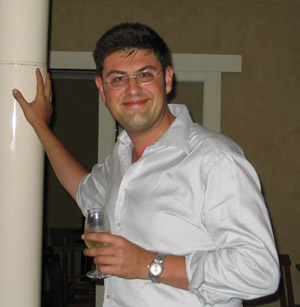|
 CHARLES TESORIERO CHARLES TESORIERO
(1973-2005)
Charles Tesoriero, who was born on 2nd July 1973 and committed suicide on 21st August 2005, was one of the brightest young stars in the Australian Classical firmament. A hugely engaging character, with a larger than life personality, he attracted a wide range of persons to the study of Latin, which was both his career and his passion.
Charles’s dedication to Roman language and literature began at Sydney Grammar School, where initial thoughts of a career in medicine were abandoned after the loss of both his parents to cancer within six weeks of each other. This was a defining event in the life of the 16 year old Charles, even if he appeared to address it with astonishing fortitude: going so far as to suppress mention of it to his teachers at University, lest he seemed to be entering a plea for sympathy.
After graduating with Honours in Latin, having written a first-rate 4th year thesis on ‘horrific violence in Virgil’s Aeneid’, Charles embarked upon his PhD at Sydney. This was a commentary on the Erictho episode of the first century AD epic poet Lucan. But the broader historical canvas against which the poem is set also resonated with Charles’s lifelong interest in the subject of political tyranny. Five years of work on his Sydney doctorate were punctuated by a good deal of teaching, particularly in the elementary Latin course. This is a popular unit, which generally attracts about 60 or so enrolments, but in at least one year when Charles was teaching it, numbers edged up towards three figures - probably because word had got around among the student body of the endless informal tutorials which Charles staged in the Main Quadrangle over equally endless cigarettes. More than anything else this gives one the measure of the man: he was unshakeably and unselfishly committed to the teaching of Latin and to communicating to others the intense pleasure which he took in its language and literature.
After receiving his doctorate with enthusiastic plaudits from his examiners, Charles was appointed as a lecturer in Classics and Ancient History at UNE, where he remained until his death. During his years in Armidale he kept in regular contact with his countless friends in Sydney, regularly visiting there every January to teach in the Latin Summer School along with his partner, and, latterly, Armidale colleague Tamara Neal. At UNE his expertise, immense charisma and bonhomie caused students to flock to him, and at the time of his death he was supervising no less than five Latin Honours theses; one of them, intriguingly, on volcanoes in Roman literature, an idea surely suggested to Charles by his paternal family’s origins in the volcanic Aeolian Islands. Part of his appeal may have been that Charles never stood on his dignity: while his dress sense, once impeccably bad, had undergone some amelioration over the years, he never mastered the trick of keeping his shirt tucked into his trousers. All in all, he made an immense impression at UNE; one of his more memorable achievements there was to organise in 2001 an international conference on Ancient Magic entitled ‘Hecate at the Crossroads’.
Charles was an inveterate attender at conferences both in Australasia and Italy, which gave him a chance to air sometimes zany ideas and to indulge his boundless sociability. He was also just beginning to reach his full maturity as a scholar. He had already published extensively on Lucan, was editing the Oxford Studies on Lucan and had papers in press on Catullus and the Laus Pisonis, as well as work in hand on Cicero’s panegyric Pro Marcello and the 330 lines of Lucan book 6 which he had not covered in his doctoral thesis. Some of this research reflects Charles’s fascination with the byways rather than the highways of Latin literature, which so piqued the interest of his students. He leaves a substantial body of unfinished work and it is good to know that efforts are under way in various quarters to ensure that it will see the light of day. |

